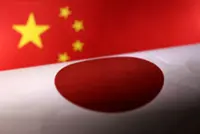NEW YORK: Foreign-exchange traders are too sanguine about the prospects for a trade truce between the world’s two largest economies.
That’s the view of economists at the Institute of International Finance, who caution that it’s premature to wager on the U.S. and China reaching an accord prior to Washington’s March 1 deadline for a breakthrough.
Treasury Secretary Steven Mnuchin is reportedly traveling to Beijing next week to continue discussions, less than three weeks before the U.S. has said it will raise tariffs on $200 billion worth of Chinese goods from 10 percent to 25 percent.
That risk to investors was on display Thursday, when the offshore yuan fell 0.1 percent against the dollar after CNBC reported that a meeting between U.S. President Donald Trump and Chinese President Xi Jinping was “highly unlikely” to take place by March 1.
Yet despite the slide, the Chinese currency is still 1.3 percent stronger against the greenback this year amid optimism that the two countries can cut a deal.
“If we’ve unwound basically half of that move from 6.40 to 6.90, we’re implicitly pricing in a roll-back of the tariffs, and we really have no certainty of that,” said IIF chief economist Robin Brooks.
“I can easily imagine that all the tariffs that exist stay in place for some time. If that’s the case, there’s no reason for the renminbi to appreciate.”
The offshore yuan weakened to a decade-low of 6.98 per dollar in early November as relations between the U.S. and China soured, heightening fears that a trade war would lead to a global slowdown.
The Chinese currency has rallied to about 6.7848 per dollar in the months since, with traders piling into bullish bets amid signs that tensions may be easing.
In addition, the inclusion of China’s domestic stocks and bonds in global benchmarks could help drive $100 billion of inflows and spur the yuan to 6.65 against the U.S. dollar by the end of this year, Lemon Zhang, macro and FX strategist at Standard Chartered PLC, told Bloomberg TV.
However, given that China still tightly manages its currency, it’s a “bold call” to plow into long yuan wagers, Brooks warns. Recent yuan strength can be partly explained by negotiation tactics, according to IIF deputy chief economist Sergi Lanau, leaving investors vulnerable should talks fall through.
“It’s an exchange rate set by human beings, it’s not just floating freely,” Lanau said. “So I think that appreciation reflects, to some extent, that they think it’s good in the negotiations.” - Bloomberg





